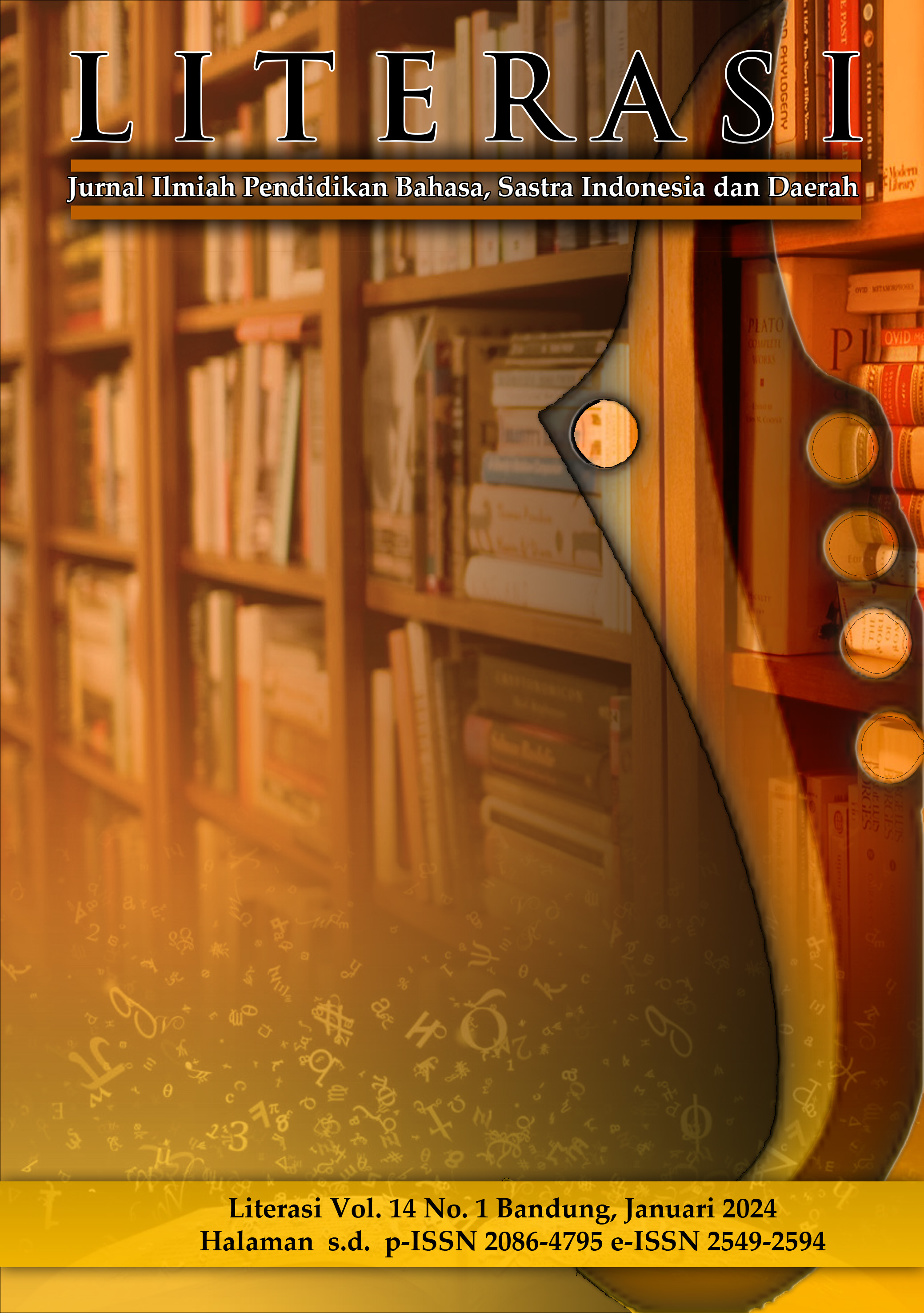FAKTOR-FAKTOR PREDIKTIF YANG MEMPENGARUHI KEMAMPUAN MENULIS SISWA SEKOLAH DASAR
DOI:
https://doi.org/10.23969/literasi.v14i1.10249Abstract
One of the language skills that must be mastered by students is writing ability. Writing ability is one of the foundations for students to develop effective written communication skills. However, the reality on the ground shows that not all students are able to master writing skills. The purpose of this research is to show the predictive factors that influence students' writing skills in elementary schools. The research method used is the correlational survey method. This research involved one hundred elementary school studentss. The students were given exercises in the form of free essay writing. Then the students were given a questionnaire to find out the predictive factors that influenced them. The results of the study show that predictive factors do not significantly influence the writing abilities of elementary school students.
Downloads
References
Anqi Peng & Meagan M. Patterson (2021): Relations among cultural identity, motivation for language learning, and perceived English language proficiency for international students in the United States, Language, Culture and Curriculum, DOI: 10.1080/07908318.2021.1938106
Audrey De Smet, Laurence Mettewie, Philippe Hiligsmann, Benoît Galand & Luk Van Mensel (2019): Does CLIL shape language attitudes and motivation? Interactions with target languages and instruction levels, International Journal of Bilingual Education and Bilingualism, DOI: 10.1080/13670050.2019.1671308
Bokander, L. (2020). Language Aptitude and Crosslinguistic Influence in Initial L2 Learning. Journal of the European Second Language Association, 4(1), 35–44. DOI: https://doi.org/10.22599/jesla.69
Celik-Yavas, G. & Yavuz, F. (2020). The role of the language aptitude and self-reported strategy use on the achievement of EFL learners. Global Journal of Foreign Language Teaching. 10(1), 032-048. https://doi.org/10.18844/gjflt.v10i1.4412
Dongmei Ma, Tian Yao & Haomin Zhang (2017): The effect of third language learning on language aptitude among English-major students in China, Journal of Multilingual and Multicultural Development, DOI: 10.1080/01434632.2017.1410162
Ellen W. R. van den Broek, Helma W. Oolbekkink-Marchand, Ans M. C. van Kemenade, Paulien C. Meijer & Sharon Unsworth (2022) Stimulating language awareness in the foreign language classroom: exploring EFL teaching practices, The Language Learning Journal, 50:1, 59-73, DOI: 10.1080/09571736.2019.1688857
Gasca Jiménez, Laura, and Sergio Adrada-Rafael. 2021. Understanding Heritage Language Learners’ Critical Language Awareness (CLA) in Mixed Language Programs. Languages 6: 37. https:// doi.org/10.3390/languages6010037
Habók A and Magyar A (2018) The Effect of Language Learning Strategies on Proficiency, Attitudes and School Achievement. Front. Psychol. 8:2358. doi: 10.3389/fpsyg.2017.02358
Hamideh Taheri, Firooz Sadighi, Mohammad Sadegh Bagheri & Mohammad Bavali | (2020) Investigating the relationship between Iranian EFL learners’ use of language learning strategies and foreign language skills achievement, Cogent Arts & Humanities, 7:1, 1710944, DOI: 10.1080/23311983.2019.1710944
Irina Makarova, Joana Duarte & Marcela I. Huilcán (2023) Experts’ views on the contribution of language awareness and translanguaging for minority language education, Language Awareness, 32:1, 74-93, DOI: 10.1080/09658416.2021.1963976
McNeil, L. (2019). Implementing digital game-enhanced pedagogy: Supportive and impeding language awareness and discourse participation phenomena. ReCALL FirstView, 1–19. https://doi.org/10.1017/S095834401900017X
Riehl, Claudia Maria. 2021. The Interplay of Language Awareness and Bilingual Writing Abilities in Heritage Language Speakers. Languages 6: 94. https://doi.org/10.3390/ languages6020094
Sartika, D. H. M., Santihastuti, A., Wahjuningsih, E. (2019). The Learning Strategies Used by EFL Students in Learning English. IJEE (Indonesian Journal of English Education), 6(1), 10-20. doi:10.15408/ijee.v6i1.12111
Tabitha Kidwell & Hanung Triyoko (2021): Language awareness as a resource for multilingual individuals’ learning about culture: a case study in the Javanese context, Journal of Multilingual and Multicultural Development, DOI: 10.1080/01434632.2021.1922421
Turker, S., Seither-Preisler, A., & Reiterer, S. M. (2021). Examining individual differences in language learning: A neurocognitive model of language aptitude. Neurobiology of Language, 2(3), 389–415. https://doi.org /10.1162/nol_a_00042
Ting Huang, Hanneke Loerts & Rasmus Steinkrauss (2022) Them impact of second- and third-language learning on language aptitude and working memory, International Journal of Bilingual Education and Bilingualism, 25:2, 522-538, DOI: 10.1080/13670050.2019.1703894
Violetta Dmitrenko (2017) Language learning strategies of multilingual adults learning additional languages, International Journal of Multilingualism, 14:1, 6-22, DOI: 10.1080/14790718.2017.1258978
Wulandari, B. A. (2018). An Evaluation of Language Learning Strategies Used by English Students. IJEE (Indonesian Journal of English Education), 5(1), 16-25. doi:10.15408/ijee.v5i1.8460
Xabier San Isidro & David Lasagabaster (2020): Students’ and families attitudes and motivations to language learning and CLIL: a longitudinal study, The Language Learning Journal, DOI: 10.1080/09571736.2020.1724185
YUCEL YILMAZ and GISELA GRANENA The role of cognitive aptitudes for explicit language learning in the relative effects of explicit and implicit feedback. Bilingualism: Language and Cognition, Available on CJO 2015 doi:10.1017/S136672891400090X
Downloads
Published
Issue
Section
License
Copyright (c) 2024 Literasi: Jurnal Ilmiah Pendidikan Bahasa, Sastra Indonesia dan Daerah

This work is licensed under a Creative Commons Attribution 4.0 International License.
Hak cipta artikel yang diterbitkan di jurnal ilmiah dimiliki oleh penerbit, bukan penulis. Hal ini berkaitan dengan koordinasi hak akses untuk cetak ulang atau penggunaan lainnya. Dalam hal ini penerbit mempunyai keluluasaan untuk mempublikasikan artikel sesuai dengan kesepakanan Transfer Agreement (penyerahan hak cipta) antara penerbit dengan penulis.















